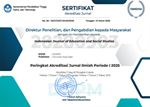Asif, T., Guangming, O., Haider, M. A., Colomer, J., Kayani, S., & Amin, N. U. (2020). Moral Education for Sustainable Development: Comparison of University Teachers' Perceptions in China and Pakistan. Sustainability, 12(7), 3014. https://doi.org/10.3390/su12073014
Beal, B. (2020). What Are the Irreducible Basic Elements of Morality?, A Critique of the Debate Over Monism and Pluralism In Moral Psychology. Perspectives on Psychological Science, 15(2), 273-290. https://doi.org/10.1177/1745691619867106
Camiré, M., Newman, T. J., Bean, C., & Strachan, L. (2022). Reimagining Positive Youth Development and Life Skills in Sport Through A Social Justice Lens. Journal of Applied Sport Psychology, 34(6), 1058-1076. https://doi.org/10.1080/10413200.2021.1958954
Darmawan, M. D., & Dagamac, N. H. (2021). Situation of Environmental Education in Senior High School Programs in Indonesia: Perspectives from the Teachers of Palembang. Interdisciplinary Journal of Environmental and Science Education, 17(3), e2241. https://doi.org/10.21601/ijese/9605
Khader, S. J. (2020). The Feminist Case Against Relational Autonomy. Journal of Moral Philosophy, 17(5), 499-526. https://doi.org/10.1163/17455243-20203085
Lateh, A., Waedramae, M., Weahama, W., Suvanchatree, S., Yeesaman, N., Buathip, S., & Khuhamuc, S. (2021). Developing Action Research Model for Thai Tertiary Classrooms. International Journal of Instruction, 14(1), 567-586. https://doi.org/10.29333/iji.2021.14134a
Lee, J. Y. (2023). Relational Approaches to Personal Autonomy. Philosophy Compass, 18(5), e12916. https://doi.org/10.1111/phc3.12916
Macalister, J. (2023). Context, communities, and conflict: Novice language teachers in Malaysia. Tesol Quarterly, 57(1), 64-89. https://doi.org/10.1002/tesq.3122
Meek, D. R. (2020). Dinner table syndrome: A Phenomenological Study of Deaf Individuals' Experiences with Inaccessible Communication. The Qualitative Report, 25(6), 1676A-1694. https://doi.org/10.46743/2160-3715/2020.4203
Mishchanchuk, V. (2022). Methodological Aspects of Suggested Practices for Future Music Teachers Training in Performance. Ukrainian Journal of Educational Studies and Information Technology, 10(2), 26-41. https://doi.org/10.32919/uesit.2022.02.03
Putrayasa, I. B., & Ramendra, D. P. (2021). Syntactic Study Based on Character Education Values Essays of Fourth Grade Elementary School Student in Bali Province. International Journal of Linguistics, Literature and Culture, 7(5), 396-404.
Raftery, D., & Delaney, C. (2022). Irish Nuns and Education in the Anglophone World, 1800-1900. Feminist Theology, 30(3), 245-261. https://doi.org/10.1177/09667350221085167
Riazi, N. A., Brussoni, M., Vertinsky, P., & Faulkner, G. (2021). "Well, You Feel More Responsible When You're Unsupervised": Exploring Family Perspectives on Children's Independent Mobility. Children, 8(3), 225. https://doi.org/10.3390/children8030225
Saimon, M., Lavicza, Z., & Dana-Picard, T. (2023). Enhancing the 4Cs Among College Students of a Communication Skills Course in Tanzania Through A Project-Based Learning Model. Education and Information Technologies, 28(6), 6269-6285. https://doi.org/10.1007/s10639-022-11406-9
Saracho, O. N. (2023). Theories of Child Development and Their Impact on Early Childhood Education and Care. Early Childhood Education Journal, 51(1), 15-30. https://doi.org/10.1007/s10643-021-01271-5
Sechandini, R. A., Ratna, R. D., Zakariyah, Z., & Na'imah, F. U. (2023). Multicultural-Based Learning of Islamic Religious Education for the Development of Students' Social Attitudes. At-Tadzkir: Islamic Education Journal, 2(2), 106-117. https://doi.org/10.59373/attadzkir.v2i2.27
Skyer, M. E. (2023). Vygotskian Perspectives in Deaf Education: An Introduction in Two Movements. American Annals of the Deaf, 168(1), 12-36. https://doi.org/10.1353/aad.2023.a904165
Steć, M., & Kulik, M. M. (2021). The Psycho-Didactic Approach in Religious and Moral Education. Towards Personal Growth and Positive Mental Health of Students. Religions, 12(6), 424. https://doi.org/10.3390/rel12060424
Tong, D. H., Nguyen, T. T., Uyen, B. P., Ngan, L. K., Khanh, L. T., & Tinh, P. T. (2022). Realistic Mathematics Education's Effect on Students' Performance and Attitudes: A Case of Ellipse Topics Learning. European Journal of Educational Research, 11(1), 403-421. https://doi.org/10.12973/eu-jer.11.1.403
Vanluydt, E., Verschaffel, L., & Van Dooren, W. (2022). The Role of Relational Preference in Word-Problem Solving in 6-To 7-Year-Olds. Educational Studies in Mathematics, 110(3), 393-411. https://doi.org/10.1007/s10649-021-10139-9
Westin, M. (2022). The framing of power in communicative planning theory: Analysing the work of John Forester, Patsy Healey and Judith Innes. Planning Theory, 21(2), 132-154. https://doi.org/10.1177/14730952211043219
Yaakob, M. F. M., Awang, H., Ismail, M. Z., Zain, F. M., Kasim, M., & Adnan, A. A. Z. (2020). Backward and Forward Reviews on Technical and Vocational Education and Training (Tvet) in Malaysia: The Evolution and Ict-Driven Future Prospect. Universal Journal of Educational Research, 8(6), 2197-2203. https://doi.org/10.13189/ujer.2020.080601
Yuan, L., Novack, M., Uttal, D., & Franconeri, S. (2024). Language Systematizes Attention: How Relational Language Enhances Relational Representation by Guiding Attention. Cognition, 243, 105671. https://doi.org/10.1016/j.cognition.2023.105671
 (Victoria University of Wellington)
(Victoria University of Wellington) 



